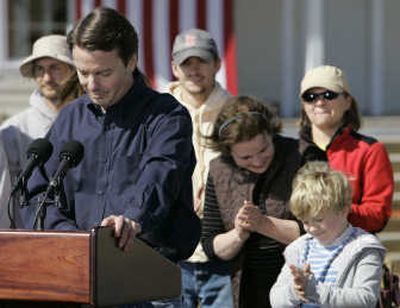Clinton, Obama vie for Edwards supporters

WASHINGTON – He launched his campaign in the hurricane-ravaged quarters of New Orleans and traveled through Appalachia, talking about poverty and railing against corporate greed and financial disparities. But something strange happened as John Edwards built his campaign for president: He drew votes from an economically diverse bloc of voters, mostly white men, who were just as likely to be rich as they were to be poor.
Now that Edwards’ departure from the campaign has left a two-person race for the Democratic nomination, Sens. Hillary Rodham Clinton and Barack Obama are trying to figure out how to attract those voters. And because his support was hard to characterize – the one thing it was not was disproportionately poor – his political base is the subject of a scramble.
The latest surveys show Edwards supported by as much as 15 percent of the Democratic vote, enough to make the difference Tuesday when voting takes place in more than 20 states as part of a nationwide primary day. But where these voters’ sympathies will lie is a mystery.
The two senators moved quickly Wednesday to attract that base, adopting pieces of Edwards’ populist message.
Clinton, of New York, lauded Edwards for making poverty “a centerpiece of his candidacy” and said the issue should be “on the top of the list of American priorities.” Obama, from Illinois, called Edwards’ return to New Orleans a “gracious way to end” his campaign.
Edwards said Wednesday in New Orleans that he dropped out only after receiving assurances from Clinton and Obama that they would make poverty a central theme of their campaigns and, if elected, their presidency.
But the decision by the former North Carolina senator to leave the race, along with the surprising makeup of his supporters, suggests that the fiery populism he brought to the campaign was a doomed strategy from the beginning.
Poverty and income inequality “may not be the primary thing you want to hang your campaign on,” said Harry Holzer, an economist with Georgetown University and the Urban Institute in Washington. “Especially poverty – since it doesn’t directly affect most voters, you probably don’t want to make that your primary reason for running.”
Edwards made poverty a central, animating mission for his candidacy. He also talked often of the problems of working-class Americans, repeatedly reminding voters that his father had been a mill laborer.
Over time, his campaign took on a more emphatic and even angry tone, as he drew pictures of insurance companies denying health coverage that could save patients’ lives. He promised to kick corporate interests out of the room when negotiating public policy, saying his hardball tactics would work where his opponents’ would fail. “You can’t ‘nice’ these people to death,” he said.
But Edwards’ tone might have run too hot for the taste of some voters, even those feeling anxious about the economy.
Americans are generally reluctant to embrace anti-corporate messages, Holzer said. Similarly, he said, many people are uneasy with attempts to rein in free trade and place new constraints on the rich, as Edwards suggested.